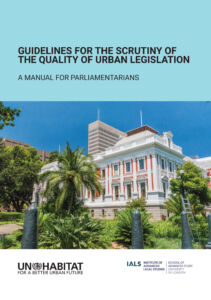Guidelines For the Scrutiny of the Quality of Urban Legislation: A Manual for Parliamentarians
Urban legislation is an important development tool for urban growth as it provides a framework in which to mediate and balance competing public and private interests, especially in relation to land use and development; creates a stable and predictable framework for public and private sector action; guarantees the inclusion of the interests of vulnerable groups; and provides a catalyst for local and national discourse.
Parliaments are the main branch of government with the constitutional mandate to legislate and adopt legislation. This is a significant privilege, but it is also an important responsibility for parliaments that need to make sure, firstly that they produce legislation of the best possible quality; secondly, that the law is producing the desired results; and thirdly that required action is taken to correct “errors” and improve its effectiveness. What might read like a good urban law before adoption might produce unwanted effects and impacts or might need to be amended to fully respond to needs in reality. Legislative scrutiny is a systematic process that needs to take place throughout the life cycle of legislation.
Consequently, UN-Habitat, in collaboration with the Institute of Advanced Legal Studies, University of London, UK has prepared these Guidelines for the Scrutiny of the Quality of Urban Legislation: A Manual for Parliamentarians to act as a point of reference and reflection into quality law-making for all parliamentarians and lawmakers, with the hope of stimulating discussion over ways to address shortcomings in urban legal frameworks.
- Downloads 115
- Views 373
- File Size 13.6 MB
- Languages 1


